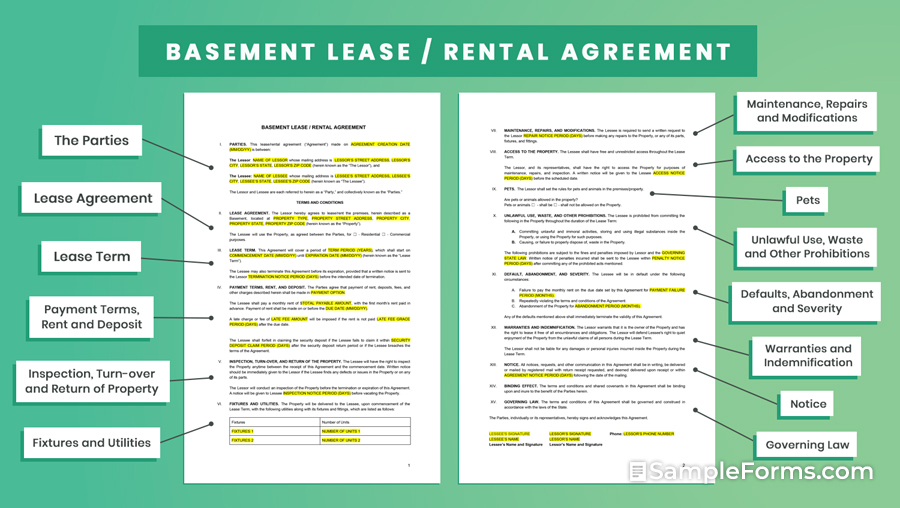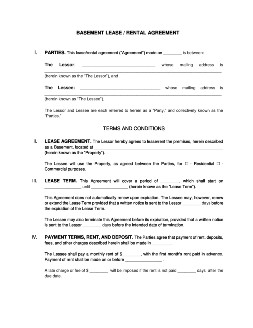- Eviction Notice Forms
- Power of Attorney Forms Forms
- Bill of Sale (Purchase Agreement) Forms
- Lease Agreement Forms
- Rental Application Forms
- Living Will Forms Forms
- Recommendation Letters Forms
- Resignation Letters Forms
- Release of Liability Agreement Forms
- Promissory Note Forms
- LLC Operating Agreement Forms
- Deed of Sale Forms
- Consent Form Forms
- Support Affidavit Forms
- Paternity Affidavit Forms
- Marital Affidavit Forms
- Financial Affidavit Forms
- Residential Affidavit Forms
- Affidavit of Identity Forms
- Affidavit of Title Forms
- Employment Affidavit Forms
- Affidavit of Loss Forms
- Gift Affidavit Forms
- Small Estate Affidavit Forms
- Service Affidavit Forms
- Heirship Affidavit Forms
- Survivorship Affidavit Forms
- Desistance Affidavit Forms
- Discrepancy Affidavit Forms
- Guardianship Affidavit Forms
- Undertaking Affidavit Forms
- General Affidavit Forms
- Affidavit of Death Forms
Basement Lease Agreement
Basements are common as stock rooms or rooms for extra stuff and tools. But, others see other potential uses for these spaces. Leasing your basement is one way of putting it into good use. And if you want a safe, secure, and clear lease terms and conditions, writing a Basement Lease Agreement is the proper thing to do. Read on in this article to learn more. Read More
Basement Lease Agreement
- What is a Basement Lease/ Rental Agreement?
- How to Write a Basement Lease/ Rental Agreement
- Frequently Asked Questions
- Can I have my basement lease/rental agreement notarized?
- How can I determine the security deposit for my basement lease/rental agreement?
- Is it okay to ask for a pet deposit in my basement lease/rental agreement?
- Can I indemnify myself in a basement lease/rental agreement?
- How long does it take for a basement lease/rental agreement to take effect?
What is a Basement Lease/ Rental Agreement?

A Basement Lease Agreement is a document outlining the terms and conditions of a basement’s lease. It indicates the parties involved in the lease, as well as their rights and obligations towards it. The document also sets the amount of rent and other fees, and also the period the lease covers. The agreement is also useful whenever disputes escalate into legal battles.
How to Write a Basement Lease/ Rental Agreement
A basement lease/rental agreement, along with its terms and conditions, should be within the bounds of existing tenancy laws of your state. And aside from that, its provisions should be discussed and explained to the tenant as well. Listed below are the steps on how to write a legally compliant basement lease/rental agreement.
1. Begin With the Parties of the Lease
As with any type of agreement, a basement lease/rental agreement begins with introducing the parties executing the document. Here, you must state the names of the lessor and the lessee along with their respective addresses. This signifies the setting of the bonds that bind the parties with the lease’s terms and conditions.
2. Determine the Type of Lease
You can lease your basement for residential and commercial purposes, and it’s important to determine which type of lease will the agreement cover. Indicating the type of lease helps you determine the proper terms and conditions. And, it also helps you with the tenant’s obligations and right to the lease as well as yours.
3. Set the Lease Term Period
Setting the lease’s term period indicates when the lease starts and when it expires. This also reflects the type of lease for your basement. Lease periods typically last for a year and two. Aside from the start and end dates, it is also essential to include the conditions of its termination as well as an option to renew the lease.
4. Outline The Rights and Obligations of the Parties
Outlining the terms and obligations of the leasing parties sets their scope and limitations they have towards the lease. And, the terms and obligations that you set reflect on the type of lease the lessee is applying for. Here, you must set the terms of using the basement as well as the responsibilities of the leasing parties towards the property.
5. Sign and Finalize the Lease
Once all preceding steps are complete, the last this to do is to allocate a space for you and the tenant to sign on. You can usually find this on the bottom-most part of the document itself. Signing the basement lease/rental agreement signifies the parties’ acceptance of its provisions. And, doing so means finalizing the basement lease as well.
Frequently Asked Questions
Can I have my basement lease/rental agreement notarized?
Basement lease/rental agreements can be notarized for many reasons. First is because your state requires it. And second, is because you feel that adding a layer of security is necessary. Apart from that, it also depends on the lease term or period as well. Most of the time, a basement lease/rental agreement will have to be notarized if the lease covers 12 months or more.
How can I determine the security deposit for my basement lease/rental agreement?
Determining security depends on what your state’s tenancy laws say about it. That’s why it’s important to review your state’s tenancy laws before creating a basement lease/rental agreement or any lease agreement. But commonly, security deposits amount would range from a month’s worth of rent or less.
Is it okay to ask for a pet deposit in my basement lease/rental agreement?
Pet deposits are often used to cover damages caused by pets kept by tenants. And asking for such an amount depends whether you allow pets in the leased premises or not. Sometimes, it also depends on your state tenancy law’s about keeping pets on the leased premises. If you consider asking for a pet deposit, it’s better to consult your state’s tenancy laws first before creating a basement lease/rental agreement.
Can I indemnify myself in a basement lease/rental agreement?
Yes, you can. All tenancy agreements have provisions about indemnifying lessors against damages and injuries incurred during the lease. Having so reminds the lessee about the proper use of the leased premises during the lease period. And, it also helps the lessor protect the leased property as well. So don’t shy away from including such provisions when writing a basement lease/rental agreements
How long does it take for a basement lease/rental agreement to take effect?
A basement lease/rental agreement takes effect immediately after both parties signed it. But often, the parties will be allowed a grace period of 60 to 90 days for them to sign the agreement. A notice is usually sent to them, reminding them to sign the agreement within the grace period, as well. And more importantly, failing to sign the document within the given period will automatically make the lease unenforceable.
Basements are often the most overlooked part of a house or a building. They’re often used to store extra and unused stuff. But, others decided to put these forgotten spots to good and economical use. Thus, basements are leased to interested individuals who wish to have a place to stay or to do business. And to make their tenancy compliant with existing tenancy laws, a basement lease/rental agreement has to be made and signed.

